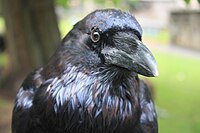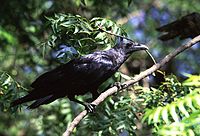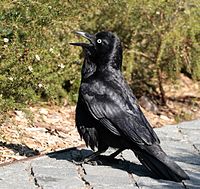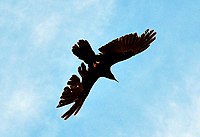Raven: Difference between revisions
m Reverted 1 edit by 64.114.207.100 (talk): I don't think so |
Demonstrating raven's intelligence Tags: Reverted extraneous markup |
||
| Line 1: | Line 1: | ||
{{Short description|Collection of birds with the same common name}} |
'''''Bold text'''''''Bold text''''''Italic text''''''''''{{Short description|Collection of birds with the same common name}} |
||
{{Other uses}} |
{{Other uses}} |
||
{{Use dmy dates|date=September 2018}} |
{{Use dmy dates|date=September 2018}} |
||
| Line 11: | Line 11: | ||
The modern English word ''raven'' has cognates in all other [[Germanic languages]], including [[Old Norse]] (and subsequently [[Icelandic language|modern Icelandic]]) {{lang|non|hrafn}}<ref>''Oxford English Dictionary'' entry for "raven".</ref> and [[Old High German]] {{lang|goh|(h)raban}},<ref>{{Cite encyclopedia| title=Raven|encyclopedia=Oxford English Dictionary|editor=Simpson, J. |editor2=Weiner, E. | year=1989 |edition= 2nd| location=Oxford |publisher=Clarendon Press|isbn= 0-19-861186-2}}</ref> all of which descend from [[Proto-Germanic]] {{lang|gem|*hrabanaz}}.<ref>{{cite web| title=Raven| work=Online Etymology Dictionary| url=http://www.etymonline.com/index.php?term=raven| access-date=14 May 2007}}</ref> |
The modern English word ''raven'' has cognates in all other [[Germanic languages]], including [[Old Norse]] (and subsequently [[Icelandic language|modern Icelandic]]) {{lang|non|hrafn}}<ref>''Oxford English Dictionary'' entry for "raven".</ref> and [[Old High German]] {{lang|goh|(h)raban}},<ref>{{Cite encyclopedia| title=Raven|encyclopedia=Oxford English Dictionary|editor=Simpson, J. |editor2=Weiner, E. | year=1989 |edition= 2nd| location=Oxford |publisher=Clarendon Press|isbn= 0-19-861186-2}}</ref> all of which descend from [[Proto-Germanic]] {{lang|gem|*hrabanaz}}.<ref>{{cite web| title=Raven| work=Online Etymology Dictionary| url=http://www.etymonline.com/index.php?term=raven| access-date=14 May 2007}}</ref> |
||
Ravens are far more intelligent than most other bird species, manipulating other animals to their own profit. they manipulate wolves into tearing meat for them and watching other birds to discover their food storages. They have also been seen playing games in their small groups of youngsters, sliding down snow banks and using sticks as toys. |
|||
[[Collective noun]]s for a group of ravens (or at least the common raven) include ‘rave’,<ref>{{Cite book|last=Lipton|first=James|url=https://books.google.com/books?id=AVNazQEACAAJ|title=An Exaltation of Larks|date=1991|publisher=Viking|isbn=978-0-670-30044-0|language=en}}</ref> ‘treachery’,<ref>{{cite web|url=http://baltimorebirdclub.org/gnlist.html | title=Baltimore Bird Club. Group Name for Birds: A Partial List | access-date=3 June 2007}}</ref> ‘unkindness’<ref>{{cite web|url=http://baltimorebirdclub.org/gnlist.html | title=Baltimore Bird Club. Group Name for Birds: A Partial List | access-date=3 June 2007}}</ref> and ‘conspiracy’.<ref>{{cite web|url=http://www.ucgc.org/terms-for-collections.htm|title=University of California Golf Club. List of Collective Nouns|url-status=live|archive-url=https://web.archive.org/web/20040918183029/http://www.ucgc.org/terms-for-collections.htm|archive-date=18 September 2004|access-date=16 July 2008}}</ref> In practice most people use the more generic ‘flock’.<ref>{{Cite web|url=https://books.google.com/ngrams/graph?content=flock+of+ravens,unkindness+of+ravens,treachery+of+ravens,conspiracy+of+ravens&year_start=1900&year_end=2008&corpus=15&smoothing=3&share=&direct_url=t1%3B%2Cflock%20of%20ravens%3B%2Cc0%3B.t1%3B%2Cunkindness%20of%20ravens%3B%2Cc0t1;,flock%20of%20ravens;,c0;.t1;,unkindness%20of%20ravens;,c0|title=Google Ngram Viewer|website=books.google.com|access-date=2020-01-05}}</ref> |
[[Collective noun]]s for a group of ravens (or at least the common raven) include ‘rave’,<ref>{{Cite book|last=Lipton|first=James|url=https://books.google.com/books?id=AVNazQEACAAJ|title=An Exaltation of Larks|date=1991|publisher=Viking|isbn=978-0-670-30044-0|language=en}}</ref> ‘treachery’,<ref>{{cite web|url=http://baltimorebirdclub.org/gnlist.html | title=Baltimore Bird Club. Group Name for Birds: A Partial List | access-date=3 June 2007}}</ref> ‘unkindness’<ref>{{cite web|url=http://baltimorebirdclub.org/gnlist.html | title=Baltimore Bird Club. Group Name for Birds: A Partial List | access-date=3 June 2007}}</ref> and ‘conspiracy’.<ref>{{cite web|url=http://www.ucgc.org/terms-for-collections.htm|title=University of California Golf Club. List of Collective Nouns|url-status=live|archive-url=https://web.archive.org/web/20040918183029/http://www.ucgc.org/terms-for-collections.htm|archive-date=18 September 2004|access-date=16 July 2008}}</ref> In practice most people use the more generic ‘flock’.<ref>{{Cite web|url=https://books.google.com/ngrams/graph?content=flock+of+ravens,unkindness+of+ravens,treachery+of+ravens,conspiracy+of+ravens&year_start=1900&year_end=2008&corpus=15&smoothing=3&share=&direct_url=t1%3B%2Cflock%20of%20ravens%3B%2Cc0%3B.t1%3B%2Cunkindness%20of%20ravens%3B%2Cc0t1;,flock%20of%20ravens;,c0;.t1;,unkindness%20of%20ravens;,c0|title=Google Ngram Viewer|website=books.google.com|access-date=2020-01-05}}</ref> |
||
Revision as of 23:27, 16 March 2022
Bold text''Bold text'Italic text'''''

A raven is any of several larger-bodied bird species of the genus Corvus. These species do not form a single taxonomic group within the genus. There is no consistent distinction between "crows" and "ravens", and these appellations have been assigned to different species chiefly on the basis of their size.[citation needed]
The largest raven species are the common raven and the thick-billed raven.
Etymology
The term ‘raven’ originally referred to the common raven (Corvus corax), the type species of the genus Corvus, which has a larger distribution than any other species of Corvus, ranging over much of the Northern Hemisphere.
The modern English word raven has cognates in all other Germanic languages, including Old Norse (and subsequently modern Icelandic) hrafn[1] and Old High German (h)raban,[2] all of which descend from Proto-Germanic *hrabanaz.[3]
Ravens are far more intelligent than most other bird species, manipulating other animals to their own profit. they manipulate wolves into tearing meat for them and watching other birds to discover their food storages. They have also been seen playing games in their small groups of youngsters, sliding down snow banks and using sticks as toys.
Collective nouns for a group of ravens (or at least the common raven) include ‘rave’,[4] ‘treachery’,[5] ‘unkindness’[6] and ‘conspiracy’.[7] In practice most people use the more generic ‘flock’.[8]
Current species
- Corvus albicollis – white-necked raven (eastern and southern Africa)
- Corvus corax – common raven (northern hemisphere)
- Corvus coronoides – Australian raven (Australia)
- Corvus crassirostris – thick-billed raven (Horn of Africa)
- Corvus cryptoleucus – Chihuahuan raven (United States and Mexico)
- Corvus mellori – little raven (southeastern Australia)
- Corvus rhipidurus – fan-tailed raven (eastern Africa and Arabian peninsula)
- Corvus ruficollis – brown-necked raven (northern Africa, Arabian peninsula, Greater Middle East)
- Corvus tasmanicus – forest raven (Tasmania, southern Victoria and north-east NSW in Australia)
-
Head of a common raven
-
Common ravens
-
Raven with a damaged wing. It can still fly with ease.
Extinct species
- †Corvus moriorum – Chatham raven
- †Corvus antipodum – New Zealand raven
- †Corvus corax varius morpha leucophaeus – pied raven
See also
References
- ^ Oxford English Dictionary entry for "raven".
- ^ Simpson, J.; Weiner, E., eds. (1989). "Raven". Oxford English Dictionary (2nd ed.). Oxford: Clarendon Press. ISBN 0-19-861186-2.
- ^ "Raven". Online Etymology Dictionary. Retrieved 14 May 2007.
- ^ Lipton, James (1991). An Exaltation of Larks. Viking. ISBN 978-0-670-30044-0.
- ^ "Baltimore Bird Club. Group Name for Birds: A Partial List". Retrieved 3 June 2007.
- ^ "Baltimore Bird Club. Group Name for Birds: A Partial List". Retrieved 3 June 2007.
- ^ "University of California Golf Club. List of Collective Nouns". Archived from the original on 18 September 2004. Retrieved 16 July 2008.
- ^ "Google Ngram Viewer". books.google.com. Retrieved 5 January 2020.
External links
- Raven videos on the Internet Bird Collection
- North American ravens on eNature






